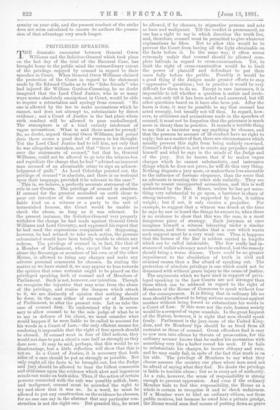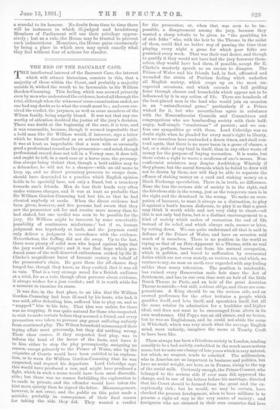PRIVILEGED SPEAKING. T HE dramatic encounter between General Owen Williams and
the Solicitor-General which took place on the last day of the trial of the Baccarat Case, has brought home to the public mind the extraordinary extent of the privilege enjoyed by counsel in regard to their speeches in Court. When General Owen Williams claimed the protection of the Court in regard to the statement made by Sir Edward Clarke as to the "false friends" who had injured Sir William Gordon-Cumming, he no doubt imagined that the Lord. Chief Justice, who in so many ways seems absolutely omnipotent in Court, would be able to require a retractation and apology from counsel. No one is allowed by the law to make accusations which he cannot, and does not attempt to, substantiate by direct evidence ; and a Court of Justice is the last place where such conduct will be allowed. to pass unchallenged. The atmosphere is of a kind entirely intolerant of vague accusations. What is said there must be proved,' So, no doubt, argued. General Owen Williams, and prima facie there seems a good deal of reason in his thought. Yet the Lord Chief Justice had to tell him, not only that he was altogether mistaken, and that "there is no control over the statements of counsel," but that he, General Williams, could not be allowed to go into the witness-box and repudiate the charge that he had "advised an innocent man accused of an abominable crime to sign an acknow- ledgment of guilt." As Lord Coleridge pointed out, the privilege of counsel "is absolute, and there is no restraint upon their language, provided it be relevant to the case," This is, we believe, a perfectly accurate statement of the rule in our Courts. The privilege of counsel is absolute. If counsel for the greatest scoundrel on earth chose to pour out invective of the coarsest and most unjusti- fiable kind on a witness or a party to the suit of untarnished honour, the Court would be unable to check the abuse, so long as it was relevant. In the present instance, the Solicitor-General very properly withdrew the charge he had made against General Owen Williams and Lord Coventry, and expressed his regret that he had used the expressions complained of. Supposing, however, he had refused. to take such action, the persons calumniated would have been totally unable to obtain any redress. The privilege of counsel is, in fact, like that of a Member of Parliament, who, "except 'that he may not abuse the Sovereign or members of his own or of the other House, is allowed to bring any charges and make any adverse personal comments he chooses. In stating the matter as we have stated it, we may appear to lean towards the opinion that some restraint ought to be placed on the privileged speaking both of counsel and of Members of Parliament. Such is not, however, our intention. Though we recognise the injustice that may arise from the abuse of the privilege, and realise the dangers which attach to it, we are distinctly of opinion that nothing should. be done, in the case either of counsel or of Members of Parliament, to alter the present rule. Let us take the case of counsel first. To understand why it is neces- sary to allow counsel to be the sole judge of what he is to say in defence of his client, we must consider what would happen if he were liable to be called to account for his words in a Court of Law,—the only efficient means for rendering it impossible that the right of free speech should be abused. If counsel went in fear of libel actions, they would not dare to put a client's ease half as strongly as they dare now. It may be said, perhaps, that this would be no disadvantage, but a little reflection will show that this is not so. In a Court of Justice, it is necessary that both sides of a case should be put as strongly as possible. Not only ought all the facts to be brought out, but the Judge and jury should be allowed to hear the fullest comments and criticisms upon the evidence which alert and ingenious minds can make on both sides. Thus, if the action of certain persons connected with the suit was possibly selfish, base, and malignant, counsel must be accorded the right to try and show that it was so. In a word, he must be allowed to put any construction on the evidence ho chooses, for no one can say in the abstract that any particular con- striction is not the right one. But granted this, he must be allowed, if he chooses, to stigmatise persons and acts as base and malignant. Till the verdict is pronounced, no one has a right to say in which direction the truth lies, and, therefore, counsel must be permitted to give whatever explanations he likes. Not to allow this would be to prevent the Court from having all the light obtainable on the facts before it. In the same way, it often seems extremely unfair that counsel should be allowed com- plete latitude in regard to cross-examination. Yet, to limit the right of cross-examination would. be to limit the power of plaintiff and defendant to put their cases fully before the public. Possibly it would. be a good. thing if the Judges made greater efforts to stop " oppressive " questions ; but in practice it would be very difficult for them to do so. Except in rare instances, it is impossible to tell whether a question is unfair and. irrele- vant, not only till it has been asked and answered, but till other questions based on it have also been put. After the harm is done, it may be possible to say that counsel has acted wrongly, but usually not till then. In regard, how- ever, to criticisms and accusations made in the speeches of counsel, it must not be forgotten that the grievance is much more in theory than in practice. It sounds a terrible thing to say that a barrister may say anything he chooses, and that the persons he accuses of ill-conduct have no right to reply; but as a matter of fact, there are circumstances which usually prevent this right from being unfairly exercised. Counsel's first object is, not to create any prejudice against himself and what he says in the minds of the Judge and of the jury. But he knows that if he makes vague charges which he cannot substantiate, and insinuates things which he does not prove, he-will do this very thing. Nothing disgusts a jury more, or makes them less amenable to the influence of forensic eloquence, than the sense that an advocate is treating the other side unfairly. They are quick to resent unsupported accusations, and this is well understood by the Bar. Hence, unless he has got some- thing very substantial to go upon, a barrister is chary of strong invective. If it is supported by facts, it carries weight ; but if not, it only creates a prejudice. For example, to suggest that a witness was drunk at the time he says he saw or heard the things he swears to, when there is no evidence to show that this was the case, is a most dangerous piece of strategy. Each juryman at once imagines himself a witness labouring under a similar accusation, and then concludes that a case which wants such support must be a very weak one. Thus it happens that the license of the Bar is seldom carried to lengths which can be called intolerable. The few really bad in- stances of unfair advocacy must be endured, lest the remedy should bring a worse disease. There could be no greater impediment to the elucidation of truth in civil and, criminal causes than a Bar afraid of speaking out. The protection of absolute privilege is one which could not be dispensed with without grave injury to the cause of justice. The arguments which we have used in support of privi- leged speaking in the Law Courts are not stronger than those which can be adduced. in regard to the right of Members of the House of Commons to speak without fear of the consequences. It is fitting that in ordinary life no man should be allowed to bring serious accusations against another without being forced to substantiate his words in a Court of Law. If this were not the rule, human society would be a cesspool of vague scandals. In the great Inquest of the Nation, however, it is right that men should speak freely. Parliament is the jury-room of the United King- dom, and its Members' lips should. be as freed from all restraint as those of counsel, Great offenders find it easy to cow men into silence by threats of prosecution, for the ordinary accuser knows that he makes his accusation with something very like a halter round his neck, If he fails to substantiate his charges, he incurs obloquy and ruin, and he may easily fail, in spite of the fact that truth is on his side, The privilege of Members to say what they choose assures the country one place where men need not be afraid of saying what they feel, No doubt the privilege is liable to terrible abuse ; but so is every act of authority. As a rule, however, the sense of responsibility is strong enough to prevent oppression. And even if the ordinary Member fails to feel this responsibility, the House as a whole is certain to recognise it and to check unfairness. If a Member were to libel an ordinary citizen, not from public motives, but because he owed him a private grudge, the House would soon find means of putting down so grave
a scandal to its henour. No doubt from time to time there will be instances in which ill-judged and headstrong Members of Parliament will use their privilege oppres- sively; but as a rule, the House may be trusted to prevent such indiscretions. Meantime, the House gains enormously by being a, place in which men may speak exactly what they feel without fear of actions for slander.



































 Previous page
Previous page